Sandra Kimokoti played basketball at her high school in Nairobi, Kenya, and when she arrived at Brown she looked for a recreational league to keep her skills up. When she couldn’t find one, she took up rugby instead. It not only became an enduring passion, it became a vehicle for her social activism. In the summer of her junior year, she used rugby to teach Kenyan girls sex education.

Kimokoti wasn’t allowed to play rugby in Kenya. The principal of her school didn’t believe it was an appropriate sport for girls. At Brown she fell in love with it. “I just love to hit," she says. She also found it helped her overcome the social barriers between herself and her American classmates. "It's such a hodgepodge of people who come together and play," she says. "Nobody cares where you're from as long as you can hit someone and you're fast. You need strength and speed, and that's all that matters."
Kimokoti organized her trip to Kenya to teach rugby through a Royce Fellowship. She chose the area of western Kenya where her mother grew up, and settled on the town of Kitale, just east of the Ugandan border. Within days after her arrival, Kimokoti had the Nyabomo Secondary School’s rugby team up and running. In between grueling practice sessions, she led discussions with the girls about AIDS, teenage pregnancy, sexual violence, balancing school with housework, and setting personal goals.
Kitale is a farming town where homosexuality is a taboo topic. If HIV is discussed at all, it’s done in private. Kimokoti was careful not to break any of these social norms. "You can't take what's important at Brown,” she says, “and force it on a community where these things are not talked about."
Still, the conversations were rich and went well beyond the abstinence-only curricula taught in many Kenyan schools. Because women are so often banned from playing rugby, the girls were already running against the social norms. "You take down physical barriers, Kimokoti says, “then the mental barriers begin to fall, too."
Although Kimokoti was a biology concentrator, she wants to pursue a career in business. For now she’s working for a Kenyan consulting company, but she plans eventually to return to the United States to attend business school.
As for rugby, she says, "Hopefully, I will find a way to keep playing."
More profiles from the class of 2015:
After her family lost everything to Hurricane Katrina in 2005, G. Maris Jones ’15 reconsidered her dream of going to Brown.
Seventy-eight percent of African malaria victims are children under the age of five. Nicholas Hilton ’15 wants to change that.
Clyde Lawrence ’15 wrote music for Miss Congeniality at age 6. He's also written for Hugh Grant and jammed with Steven Tyler.
Linh Tran ’15 spent two years helping fruit growers in her native Vietnam. She hopes you'll soon be drinking their fruit juice.
Research by Hannah Begley ’15 suggests juries may be quicker to convict on weak evidence for certain pornography charges.
A single dad and a U.S. Navy veteran of nuclear submarines, Matthew Ricci ’15 is not your typical Brown student.





